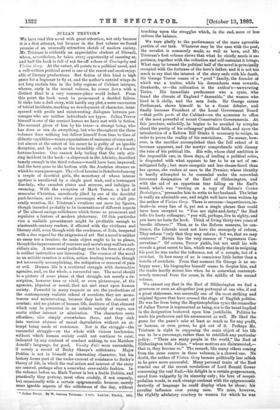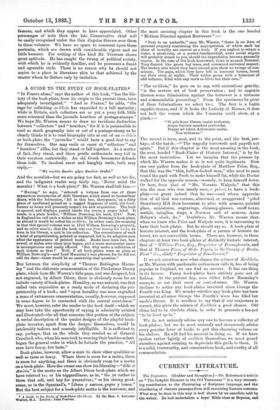JULIAN TREVOR.*
WE have read this novel with great attention, not only because it is a first attempt, but because in the first volume we found promise of an unusually attractive sketch of modern society. Mr. Tristram is evidently an appreciative student of Disraeli, whom, nevertheless, he takes every opportunity of sneering at, and half the book is full of not far-off echoes of Coningsby and Vivian Grey. At the outset, all points to a political novel, and a well-written political novel is one of the rarest and most enjoy- able of literary productions. But fiction of this kind is high game for a beginner to fly at, and the author's untried wings do not long sustain him in the lofty regions of Cabinet intrigue, whence, early in the second volume, he comes down with a distinct thud to a very common-place world indeed. From this point the book must be pronounced a decided failure. It sinks into a dull story, with hardly any plot, a mere succession of trivial incidents, marking no development of character, inter- spersed with prolix and uninteresting dialogues between per- sonages who are neither individuals nor types. Julian Trevor himself is one of the sorriest heroes we have met with in fiction. The account given of him by his tutor—a strange being, who has done or can do everything, but who throughout the three volumes does nothing but deliver himself from time to time of didactic vapidities—raises expectations of eminence of some sort; but almost at the outset of his career he is guilty of an ignoble deception, and he ends as the incredibly silly dupe of a female fortune-hunter. One cannot help feeling that the only stir- ring incident in the book—a shipwreck in the Adriatic, described tamely enough in the third volume—would have been improved, had the hero gone to the bottom with the Austrian steamer on which he was a passenger. The role of heroine is distributed among a couple of deceitful girls, the monotony of whose intense
egotism is unrelieved by a single good trait, and a termagant fine-lady, who smashes plates and mirrors, and indulges in swearing. With the exception of Mark Turner, a kind of muscular Christian, mercilessly jilted by one of the deceitful
part-heroines, and two other personages whom we shall pre- sently mention, Mr. Tristram's creations are mere lay figures, though intended probably to be incarnations of different aspects of the almost savage selfishness which forms so prominent and repulsive a feature of modern plutocracy. Of this particular vice a realistic presentment might be profitable enough to nineteenth-century readers, if effected with the vividness and literary skill, even though with the crudeness, of Zola, tempered with a due regard for the exigencies of art. But a novel is neither an essay nor a treatise; its main object ought to be to please, though the improvement of manners and morals may well be a sub- sidiary aim. A mere moral pathology cast in the form of a story is neither instructive nor interesting. The essence of the novel as an artistic creation is action, action tending towards, though not necessarily accomplishing, the mitigation or removal of pain or evil. Human life is a continual straggle with destructive agencies, and, on the whole, a successful one. The novel should be a picture of some phase of that struggle, not merely a de- scription, however true or vivid, or even picturesque, of the agencies, physical or moral, that act and react upon human society. Powerful in many respects as are the productions of the contemporary realistic school of novelists, they are mono- tonous and uninteresting, because they lack the element of combat; and no picture of human life, destitute of that element which may be presented in an infinite variety of ways, can excite either interest or admiration; The characters seem effortless, vice simply overwhelms them, and they sink into various abysses of moral degradation without an at- tempt being made at resistance. Nor is the struggle—the successful struggle—on the whole with vicious tendencies, without which human society could not continue to exist, indicated by any contrast of conduct making, to use Matthew Arnold's language, for good. Vanity Fair were unreadable, if merely a record of Becky Sharpe's selfishness. Major Dobbin is not in himself an interesting character, but his history forms part of the under-current of resistance to Becky's theory of life, in which the real action and interest of the story are centred, perhaps after a somewhat over-subtle fashion. In the volumes before us, Mark Turner is but a feeble Dobbin, and practically they portray, most often crudely, if not coarsely, but occasionally with a certain epigrammatic humour, merely some ignoble aspects of the selfishness of the day, without
• • Julian Trevor, By W. Outran Tristram. 3 vo!s. London : Tinsley. 1883.
touching upon the struggles which, in the end, more or less redress the balance.
We tarn gladly to the performance of the more agreeable portion of our task. Whatever may be the case with the poet, the novelist is commonly made, as well as born, and Mr.
Tristram's first volume shows that what he chiefly needs is ex,- perience, together with the reflection and self-restraint it brings. What may be termed the political half of the novel is principally occupied with the fortunes of the hero's father, and it is not too much to say that the interest of the story ends with his death. Sir George Trevor comes of a "good " family, the founder of which was a traitor, while his descendants were cowards,
drunkards, or—the collocation is the author's—unwavering Tories. His immediate predecessor was a cynic, who found the climate of England "damnable," the women who
lived in it chilly, and the men fools. Sir George enters Parliament, shows himself to be a fluent debater, and
finally becomes President of the Local Government Board.
—that petite ports of the Cabinet—on the accession to office of the most powerful of recent Conservative Governments. At this juncture, unluckily, he begins to be assailed by scruples
about the purity of his colleagues' political faith, and upon the introduction of a Reform Bill thinks it necessary to resign, in order to prove the reality of his convictions. No sooner, how- ever, is the sacrifice accomplished than the full extent of it becomes apparent, and the martyr comprehends with dismay the ruin of his political life. His wife, whose chief ambition is
the impossible one, in these days, of leading a political salon, is disgusted with what appears to her to be an act of un-
mitigated folly ; but more energetic and less shame-faced than her spouse, she rushes at once to the Premier, whose identity is hardly attempted to be concealed under the somewhat irreverent designation of the Earl of Slitherington, and
with the aid of an opportune tear falling on the Earl's hand, which was "resting on a copy of Balzac's Goatee Drolatiques," persuades him to write to her husband. The letter is really an admirable one, and might well have been written by the author of Vivian Grey. There is sarcasm—impertinence, in-
deed—in every line of it, yet not a single phrase that could have been excepted to. "You are eight-and-forty," the Earl tells his hasty colleague; "you will, perhaps, live to eighty, and you have no taste for hock. Think of living thirty-two years of bucolic idleness !" Then, as to the Reform measure, he con- tinues, the Liberals must not have the monopoly of reform.
They reform "only that they may reform ; but we, that we may.
conserve." Herein lies the very essence of "regenerate Con- servatism." Of course, Trevor yields, but not until his wife reveals a great secret to him, which was simply that in resigning
his post he was under the influence, not of a scruple, but of a crotchet. In how many of us is conscience little better than a
bundle of crotchets. From that moment Sir George is an un- happy man ; his biographer himself seems to despise him, and the reader hardly misses him when he is somewhat contempt- uously removed from the scene, in the middle of the second' volume.
We cannot say that in the Earl of Slitherington we find a generous or even an altogether just portrayal of one who, if not a great statesman, was assuredly one of the most striking and original figures that have crossed the stage of English politics. He was far from being the Mephistophelian cynic the counsellor of .10i= Trevor is represented as being, nor is the taunt implied in the designation bestowed upon him justifiable. Politics he made his profession and his amusement as well. He liked the game for the game's sake at least as much as for any profit, or honour, or even power, he got out of it. Perhaps Mr. Tristram is right in supposing the main object of his life was to be a personage, rather than to establish any particular policy. "There are many people in the world," the Earl of Slitherington tells Julian, "whose motives are disinterested,— that is, they become so." The remark, like many others coming from the same source in these volumes, is a shrewd one. No doubt, the author of Vision Grey became politically less selfish as he grew more successful. Many personal traits of the Earl remind one of the recent revelations of Lord Ronald Gower concerning the real Earl,—his delight in a certain gorgeousness, saved from vulgarity by its sincerity only; his love of sesqui- pedalian words, in such strange contrast with the epigrammatic dexterity of language he could display when he chose; his peculiar influence over young men. We miss, however, the slightly adulatory courtesy to women for which he was
famous, and which they appear to have appreciated. Other personages of note than the late Conservative chief will be easily recognised under the thin disguise thrown over them in these volumes. We have no space to comment upon these portraits, which are drawn with considerable vigour and no little humour. For writing of this kind Mr. Tristram shows great aptitude. He has caught the twang of political society, with which he is evidently familiar, and he possesses a fluent and agreeable style. There is no reason why he should not aspire to a place in literature akin to that achieved by the master whom he flatters only by imitation.



































 Previous page
Previous page